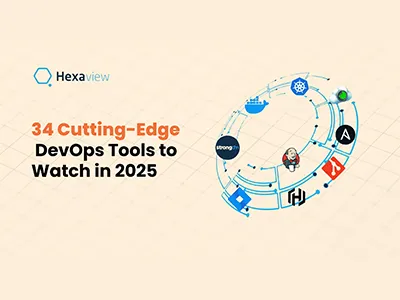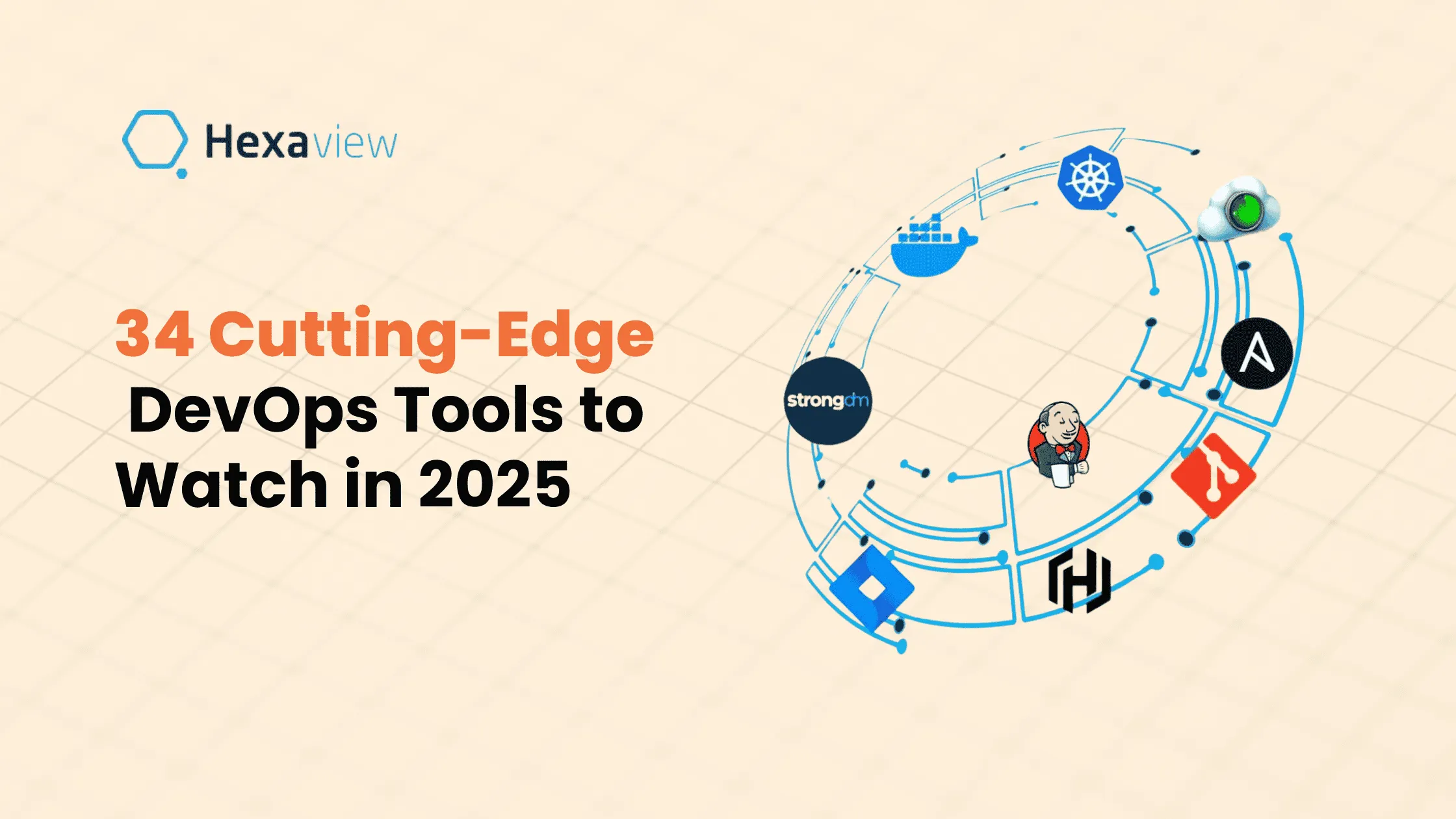DevOps represents a huge cultural shift that emphasizes collaboration between the operations team and software development. While it encourages teamwork, DevOps tools leverage the power of automation, which is important for different tasks like testing, building, incident management, and software releases. As it helps to streamline processes, the DevOps automation tools enhance product quality, time to launch, and system reliability. Over time, as it continues to evolve, it has embraced advanced machine learning, AI capabilities, cloud computing, and IoT. Today, it has gone beyond the collaborative approach as it provides specialized tools for DevOps configuration, management, incident handling, version control, and a lot more.
Today, we will take a look into the innovative DevOps automation tools that you need to keep an eye on in 2025. These tools are created with the aim of fulfilling the requirements of the organization and providing ease in management.
GitHub:
GitHub is one of the essential DevOps tools created for collaboration and version control. This tool allows developers to easily manage and store code with ease, track changes and collaborate seamlessly. With GitHub Actions, businesses can now easily automate workflows, ensure code quality, and integrate CI/CD pipelines. Its powerful issue-tracking system ensures that a solution for teams is provided that fosters team communication and project efficiency.
Jenkins
Jenkins is known to be one of the most powerful DevOps automation tools, and it is known for its open-source platform. It can be beneficial for continuous integration and continuous delivery. The tool supports a wide range of plug-ins, which ensure seamless integration with several other DevOps tools. Automate testing, building, and deployment of applications to ensure a smooth delivery pipeline while reducing manual intervention.
Chef
Chef is again one of the best DevOps tools known for its robust configuration management. The tool can automate infrastructure deployment. It makes use of recipes to define configuration of servers and ensure consistency across different environments. It can streamline provision and enable teams to deploy complicated applications faster with fewer errors. Therefore, it becomes a stable choice for infrastructure.
Ansible
Ansible is the next best DevOps tool that simplifies IT automation through its agentless architecture. The tool has been designed to allow teams to automate configuration management, task, orchestration, and application development. With the focus on capability and simplicity, the YAML-based playbooks in Ansible make it accessible for both experienced and new professional professionals.
Maven
Maven is the next powerful DevOps automation tool that is primarily used in Java projects. The tool can be beneficial for managing dependencies, simplifying project configurations, and streamlining the built processes. The clear project structure and integration capabilities with CI/CD tools of Maven make it an essential part of every developer's toolkit.
Puppet
Puppet is again one of the best DevOps tools that automate configuration management and deployment tasks. It ensures that the system remains consistent. The declarative language allows users to define the desired state of infrastructure. Puppet also ensures that the system matches its state. It also integrates seamlessly with several other DevOps tools and ensures workflow efficiency.
Docker
Docker is one of the popular DevOps tools that have revolutionized containerization. It enables developers to package application applications and dependencies into portable containers. Hence, it ensures consistency across different environments, from production to development. The lightweight and scalable architecture of Docker supports modern microservices-based applications, which makes it an indispensable choice for teams.
AppDynamics
AppDynamics is the next powerful application performance monitoring tool that can benefit developers by helping them gain a deeper understanding of application performance and user behavior. This is one of the finest DevOps automation tools that benefits developers. It diagnoses and detects issues in real-time, which helps teams optimize systems and maintain high availability. Further, it ensures seamless user experiences.
Slack
Slack is a communications tool that becomes beneficial for teams. The tool promotes collaboration within DevOps teams. The integration of this tool with others like Jira, Jenkins, and GitHub will allow developers to easily receive notifications, manage incidents directly from their workspace and discuss issues. Hence, it can be largely beneficial to streamline operations.
AWS Cloud Computing
AWS or Amazon Web Services provides a complete suite of cloud computing services customized for. With some of the services like AWS code pipelines, Lambda, and EC2, DevOps teams can automate workflows, deploy applications efficiently, and scale infrastructure. It, therefore, ensures high reliability and performance.
Selenium
Selenium is one of the popular DevOps tools that help to automate wave application testing. It supports multiple programming languages and browsers, which makes it versatile for developers. By integrating with CI/CD pipelines, Selenium ensures quick identification and robust testing for any issues in web applications.
Azure Cloud Computing
Azure, your cloud computing, is the next DevOps tool that can be greatly benefited from. It provides a comprehensive set of cloud services that cater to the requirements of DevOps teams. With tools like your Azure DevOps, Logic apps, and Kubernetes services, it supports automated workflows, seamless integration, and containerized applications across development and operation teams.
Gremlin
Gremlin enables chaos engineering. It helps teams proactively identify any kind of weaknesses in the same system. It simulates failure in a controlled environment to help teams, improve resilience, ensure application performance, and address vulnerability under real-world conditions.
Kubernetes
Kubernetes automates container or construction. It manages the deployment, operations, and scaling of containerized applications. The tool also supports complex systems with ease to ensure high availability, simplified management of microservices architecture, and resource efficiency.
Splunk Cloud
Slunk Cloud is a data analysis and log analysis platform that can empower teams. This is one of the powerful DevOps tools that can help teams get valuable insight into the system's performance. Real-time monitoring and AI driven analytics can enhance visibility, enable teams to troubleshoot on their own and optimize system performance effectively.
GCP Cloud Computing
Google Cloud Platform, or GCP, provides a great cloud solution for the works. It includes a cloud-built Kubernetes engine. This is a scalable infrastructure that has been integrated with powerful analytics and AI integration, which makes it ideal for teams that want to streamline operations and enjoy quick innovation.
Scripting
Scripting languages like Bash, Python, and PowerCell are essential for DevOps automation. These DevOps automation tools can be beneficial as they allow developers to easily write customized scripts for automating repeated tasks, managing configuration, and deploying applications effectively.
SignalFx
SignalFx provides real-time monitoring and analytics for modern applications. Predictive insights can help teams identify performance issues, optimize systems, and ensure high availability across dynamic and cloud-native environments.
Raygun
Raygun is another tool that can also be said to be an error and performance monitoring tool. This is one of the best DevOps tools that delivers detailed insight into software bugs and crashes. Real time diagnostic can be beneficial for developers to resolve issues quickly and ensure reducing downtime and optimizing user experiences.
ServiceNow
ServiceNow can be used by DevOps teams, as it helps to streamline IT service management by automating workflows and incident handling. The robust integration capabilities can enable the team to connect with tools and enhance transparency, collaboration, and operational efficiency.
GitLab CI/CD
GitLab CI/CD is an integrated platform for DevOps. It automates tests, builds, and deployment. This powerful tool can support workflow and ensure fast software delivery. The robust features like auto-scaling, pipeline monitoring, and version control make GitLab CI/CD enhance collaboration while maintaining high-quality application development.
Vagrant
Vagrant clearly simplifies the management of the development environment by enabling virtual machine provisioning. The easy-to-use configuration of these DevOps tools lets teams create a consistent environment and reduce issues related to discrepancies between production and development setups. It can be an ideal choice for improving software testing and deployment efficiency.
Status Service Updates
Status Service Updates is one of the powerful DevOps tools that has been designed to keep informing stakeholders regarding their service health and application. It provides real-time status updates and incident notifications which improve trust and transparency. DevOps teams can effectively use it to manage downtime and ensure a seamless user experience.
ELK
The ELK stack (Elasticsearch, Logstash, Kibana) is known to be a powerful analytics and logging tool. It can be beneficial for teams to collect, analyze, and visualize data in real-time. The search capabilities and capability make troubleshooting and performance monitoring much easier and effective.
Nagios
Nagios is a powerful monitoring tool that provides comprehensive information about the system's health. It can track applications, servers, and network devices while providing alerts on potential issues. The customizable dashboard and plug-in ensure high availability and operational reliability across the IT infrastructure.
Terraform
Terraform is the next infrastructure-as-code tool that enables automated provisioning and management of cloud resources. This powerful DevOps tool supports multi-cloud environments and ensures consistent configuration. By managing infrastructure as code, Terraform reduces manual intervention and simplifies capability for complex systems.
eG Enterprise
EG enterprise is a performance monitoring tool designed to optimize the IT environment. It provides end-to-end visibility into application, server, and network performances. EG enterprise's IT-driven analytics help identify bottlenecks, ensure seamless user experience, and enhance troubleshooting.
Prometheus
Prometheus is one of the best open-source DevOps tools that monitors and alerts team members. The tool kid can become ideal for a cloud-native environment. The time series database can effectively collect metric data, and alert capabilities enable proactive issue resolution. This tool can be widely used with coordinates for content application monitoring.
Jira
Jira is a popular project management tool customized for agile development. It can be beneficial for teams to track tasks, monitor project progress, and manage sprints. The integration into the DevOps pipeline makes this tool improve collaboration and ensure project alignment with business goals.
Embold
Embold is the next software analytics platform that can identify vulnerabilities and efficiency. This is one of the best DevOps tools that provide actionable insights, which help developers improve the quality of code and maintainability. Integration with CI/CD tools. Ensure that issues get addressed before deployment and enhance overall software reliability.
Phantom
Phantom is a security orchestration automation and response platform. It streamlines incident response by automating security tasks and integration with the tools. It ensures rapid identification and resolution of threats, which safeguard applications and infrastructure. It is great in terms of security.
Sentry
Sentry is the error-tracking DevOps tools that easily monitor application performance and identify bugs in real time. The detailed report can be beneficial for developers to diagnose issues effectively and ensure a smooth user experience. Integration of Sentry seamlessly into CI/CD pipelines maintains code quality.
Gradle
Gradle is a powerful build automation tool that supports multi-language development. The advanced caching and incremental build features can improve performance, which makes it faster than traditional DevOps tools. It integrates well with CI/CD and IDE systems with a streamlined software development life cycle.
Stackify Retrace
Stackify Retrace is an application performance management tool that can help developers identify and resolve performance bottlenecks. It provides a comprehensive insight into the errors, logs, and metrics, which ensure optimized application performance and efficient debugging in the production environment.
Conclusion
These tools are the backbone of modern software development. It bridges the gap between the operation and development teams to ensure seamless collaboration and better efficiency. These DevOps automation tools are not just about automating tasks, but they enable teams to innovate faster, deliver superior user experiences, and maintain system reliability. From container orchestration with Kubernetes to version control with GitHub, every DevOps automation tool plays a vital role in streamlining workflow, ensuring robust performance of applications, and managing infrastructure.
Additionally, as DevOps keeps evolving to incorporate advanced AI, machine learning and cloud computing, it relies on these cutting-edge tools to grow. These tools empower teams to handle complex deployment, proactively address issues, and monitor system. This is what makes these DevOps tools indispensable in today's changing tech landscape.
If you wish to embrace DevOps culture and leverage its capabilities, you can partner with the right technology provider to amplify success. Hexaview Technologies can be a trusted choice for adopting advanced solutions. Their expertise and knowledge of cutting-edge DevOps tools and methodologies can transform the software development lifecycle and empower growth and innovation.



%201.svg)

